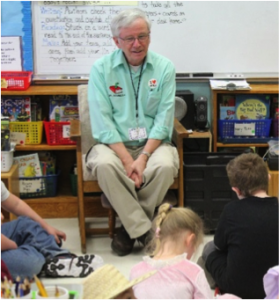2016 – 2017 Annual Report
Making a Difference
 For more than 90 years, University of Maine Cooperative Extension has worked with Maine volunteers to offer community-driven, research-based educational programs in every county. Our annual report features highlights of recent accomplishments and the difference we make in the lives of Maine citizens and their communities.
For more than 90 years, University of Maine Cooperative Extension has worked with Maine volunteers to offer community-driven, research-based educational programs in every county. Our annual report features highlights of recent accomplishments and the difference we make in the lives of Maine citizens and their communities.
The University of Maine Cooperative Extension helps support, sustain and grow the food-based economy across the entire state of Maine. It is the only entity in our state that touches every aspect of the Maine Food System, where policy, research, production, processing, commerce, nutrition and food security and safety are integral and UMaine interrelated. UMaine Extension also conducts the state’s most successful out-of-school youth education program through 4-H, empowering young people to reach their full potential.
University of Maine Cooperative Extension’s successful educational programs result from a federal, state and county government partnership. Since 1919, when the Maine Legislature passed the County Extension Act*, the University of Maine has been in all Maine communities with a county office whose operations are funded by county government. Our educational programs anticipate and respond to local and state needs and issues. We also communicate those issues and opportunities to UMaine faculty to influence their research and development plans.
UMaine Extension Piscataquis County Office Staff
- Barb Baker
- Donna Coffin
- Sheila Norman
- Trisha Smith
- Amanda Miles
- Diana Bray
- Anette Moulton
Piscataquis County Extension Association
Our County Extension Association is the vital link between the county, our communities and UMaine. The Association’s Executive Committee is comprised of local volunteers who represent community interests by advising UMaine Extension staff on educational programs, advocate for and secure funding from county government to support the county office, oversee the office budget and facilities, and guide UMaine Extension staff in identifying their programming goals.
Executive Committee
- President – Dr. Beth McEvoy, Dover-Foxcroft
- Secretary – Carole Boothroyd, Dover-Foxcroft
- Treasurer – Dr. Karen Murphy, Sebec
- Members:
- George McKay, Dover-Foxcroft
- Natasha Colbry, Dover-Foxcroft
- Richard Neal, Parkman
- Dotty Hadler, Dover-Foxcroft
- Tish Dutson, Willimantic
- Dr. Karen Murphy, Sebec
- Dave Bridges, Dover-Foxcroft
- Retiring Members:
- Walter Boomsma, Abbot
- Thelma Regan, Wellington
- Wally Sinclair, Brownville
- Janet Yelch-Weatherbee, Dover-Foxcroft
Local Partnership
The partnership between the University of Maine, County Governments, and the county Extension Associations has endured for over a century. As the needs of the people of Maine have changed, so has Cooperative Extension. We are committed to helping Maine succeed across our spectrum of programming. However, success is best achieved by collaboration with the people, businesses, organizations and communities that we work with. Extension is a reflection of the locally identified needs that form the basis for the educational programs that are offered statewide.
The county report is an important way to share the work that has been happening locally and statewide. This report is also an important way that the county Extension Association documents accountability for the investment of funds from County Government. We are very pleased to share this report with you and encourage you to contact your local office with questions or for more information on anything in this report.
John Rebar, Executive Director

As Executive Director it is my privilege to work with a wide variety of volunteers across Maine. The enthusiasm and dedication for the work of Cooperative Extension is inspiring and heartening. However, former Piscataquis County Extension Association President Walter Boomsma is in a league of his own. Walter’s commitment to the work of Extension and the people of Piscataquis County has been truly remarkable.
Walter provided essential leadership and determination at a time when the very existence of the county office was in question. Frankly, it would have been easier to close the office rather than work through a 70% loss of county funding. Giving up is not Walter’s way of working. He rose to the immense challenge and with the support of his fellow Executive Committee members, plus the work of the staff, stabilized the office and turned things around. He provided accountability to elected officials for the tax investment going to the local office and he expected accountability from our workforce — including me. In return he worked tirelessly to build public and political confidence that the investment in Extension was good for Piscataquis County — now and for the future.
Walter is willing to ask the tough questions and to work very hard for what he believes in. He is a person of conviction and can be counted upon to follow through.
I once heard that a hero was an ordinary person who, when placed in an extraordinary circumstance, does remarkable things. That is Walter Boomsma. All of Cooperative Extension is indebted to him and the Executive Committee members for making sure that the mission of Extension is alive and well in Piscataquis County. He was the right leader at the right time. We will miss him and thank him so much for all that he has done.
John Rebar, Executive Director
University of Maine Cooperative Extension
*The County Extension Act
The County Extension Act explains the role of county government in funding local Extension offices:
Cooperative extension work shall consist of the giving of practical demonstrations in agriculture and natural resources, youth development, and home economics and community life and imparting information on those subjects through field demonstrations, publications and otherwise. For the purpose of carrying out this chapter, there may be created in each county or combination of two counties within the State an organization known as a “county extension association,” and its services available to all residents of a county. The county extension is viewed as a unique and important educational program of county government. The executive committee of each county extension association shall prepare an annual budget as requested, showing in detail its estimate of the amount of money to be expended under this chapter within the county of counties for the fiscal year. The executive committee shall submit to the board of county commissioners on a date requested by the county commissioners, and the county commissioners may, if they deem it justifiable, adopt an appropriate budget for the county extension program and levy a tax therefore. The amount thus raised by direct taxation within any county or combination of counties for the purposes of this chapter shall be used for the salaries of clerks, provision of office space, supplies, equipment, postage, telephone, a contribution toward the salaries of county educators and such other expenses as necessary to maintain an effective county extension program.1
1Excerpted from Title 7, Chapter 7 of the Maine Revised Statutes, §191–§195.
